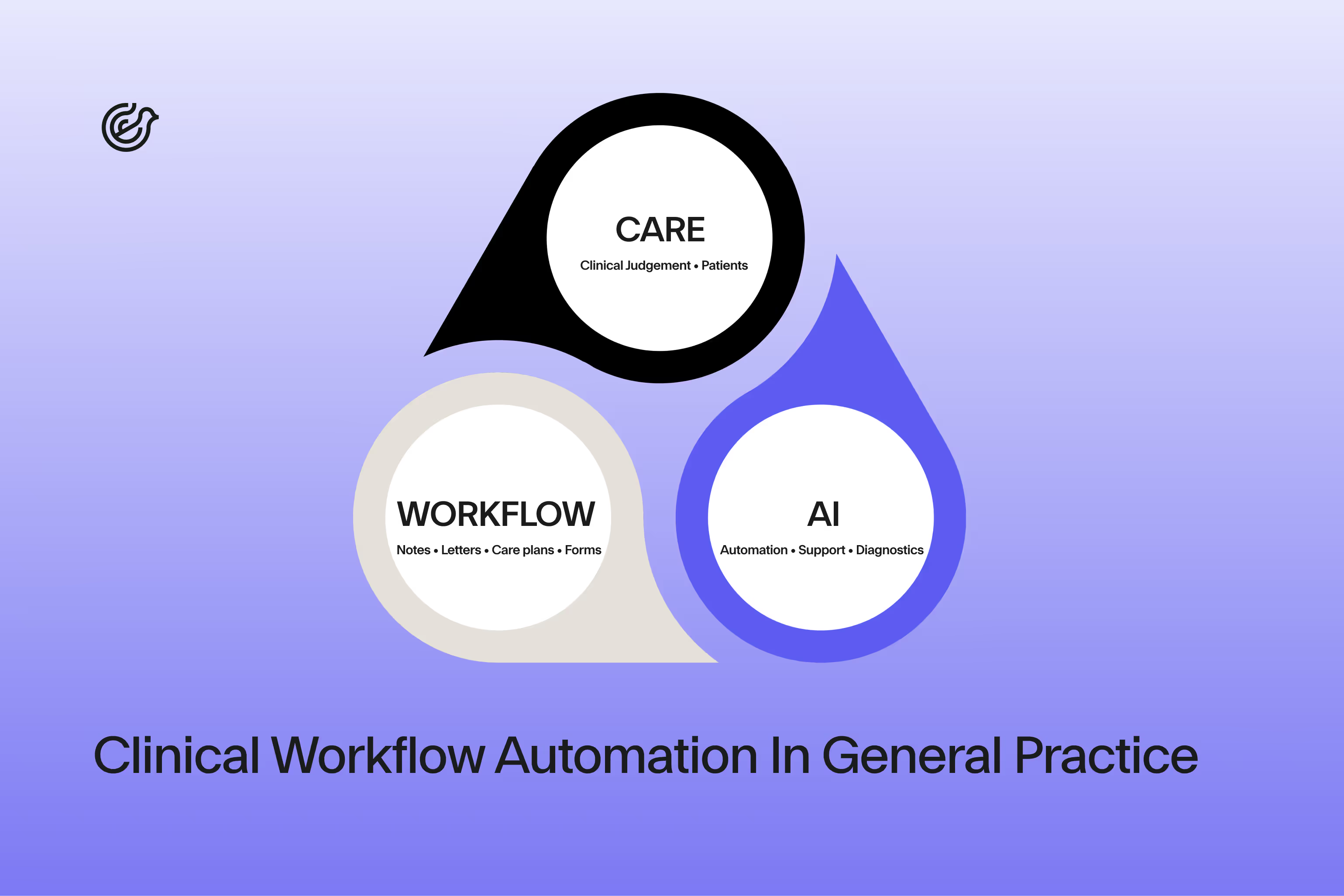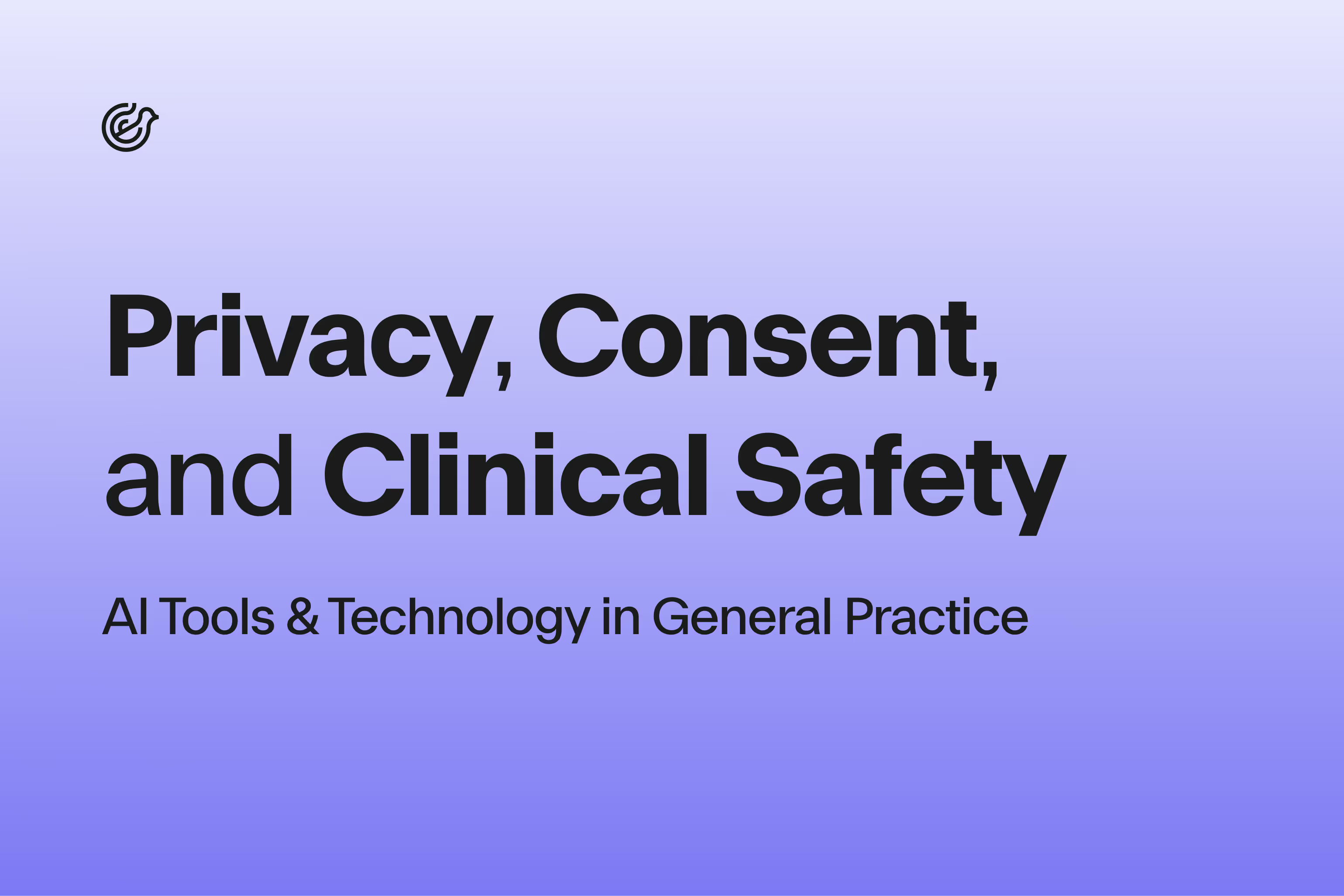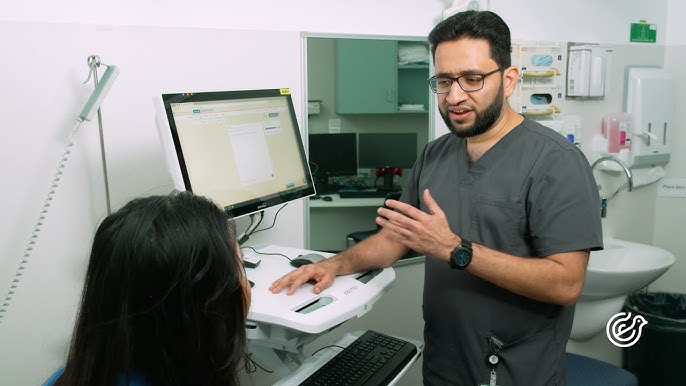AI in medical school: the impact on tomorrow’s doctors

AI is revolutionizing healthcare, and medical schools are racing to keep up. Here's what you need to know:
- AI is becoming essential in diagnosis, treatment planning, and patient care
- Only 29% of new doctors feel prepared to use AI in their practice
- Medical schools are slowly adding AI courses, but progress is uneven
- Students want AI knowledge but struggle to fit it into packed schedules
- Ethical concerns like bias and privacy need to be addressed
Key AI applications in healthcare:
| Area | AI Impact |
|---|---|
| Radiology | Faster image analysis, improved cancer detection |
| Surgery | AI-guided robotic procedures |
| Diagnostics | Early disease detection, personalized treatment plans |
| Admin | Reduced paperwork, streamlined operations |
Bottom line: Tomorrow's doctors need AI skills to thrive. Medical schools must evolve quickly to prepare students for an AI-powered healthcare future.
2. AI in medical schools today
2.1 AI courses in medical schools
Medical schools are playing catch-up with AI, but it's a slow process. A 2022 survey of 50 top US medical schools found only 18% offering dedicated AI courses. Most schools barely scratch the surface, leaving big gaps in students' AI knowledge.
Dr. Leo Anthony Celi from MIT puts it bluntly:
"There's no standard curriculum for AI in medicine. Each school is figuring it out as they go along."
A few schools are leading the pack:
- Stanford's "AI in Healthcare" course
- Harvard Medical School's AI elective
- Johns Hopkins' integrated AI modules
But these are outliers. Most schools are way behind, leaving future doctors unprepared for AI in healthcare.
2.2 Difficulties in adding AI to courses
Medical schools face some tough challenges in beefing up their AI game:
1. Packed schedules
Medical students are already drowning in information. Dr. Celi explains:
"Medical students are overwhelmed with information. Adding AI on top of that is challenging."
2. Not enough teachers
Most medical faculty can't teach AI. Schools often have to team up with computer science departments or bring in outside experts.
3. AI moves fast
AI tools change quickly. What's hot today might be old news by graduation.
4. Old habits die hard
Some educators worry that AI might push out traditional medical skills.
| Challenge | Impact | Possible Fix |
|---|---|---|
| Packed schedules | No room for AI | Mix AI into existing courses |
| Few AI teachers | Limited expertise | Team up with CS departments |
| Fast-changing AI | Outdated courses | Teach AI basics, not specific tools |
| Resistance | Slow AI adoption | Show how AI boosts medical skills |
The need for AI-savvy doctors is clear. Medical schools need to step up and prepare students for an AI-powered healthcare future.
3. Research on AI in medical education
3.1 Recent study results
A big review of AI in medical education examined 278 studies from 1992 to 2023. Here's the scoop:
- North America and the UK led the pack (49.6% of studies)
- Radiology (11.2%) and surgery (8.7%) topped the specialty list
- AI use skyrocketed after 2018
| Year | AI studies in medical education |
|---|---|
| 2018 | 11 |
| 2019 | 14 |
| 2020 | 18 |
| 2021 | 49 |
| 2022 | 57 |
| 2023 | 114 (as of August) |
This surge shows AI's rapid impact on medical training.
3.2 Main research findings
1. AI's versatility in medical education
AI can help create curricula, teach students, and assess knowledge.
2. Students crave AI knowledge
A study of 3,018 medical students revealed:
- 96.2% wanted to learn about AI in medicine
- Only 6% felt confident explaining AI risks to patients
3. AI use varies by education level
In a study of 1,243 students:
- 75% of postgrads had used medical AI
- Only 59.5% of undergrads had done the same
4. What drives AI adoption
Students are more likely to use AI when it:
- Boosts performance
- Is enjoyable
- Becomes habitual
- Seems reliable
Dr. Margaret Lozovatsky from the AMA notes:
"AI has been used in health care for a very long time... And yet in 2023, the change was ChatGPT."
This highlights how new AI tools are reshaping medical education.
5. Schools adapting to AI
Dr. Kim Lomis from the AMA says:
"The good news is that AI touches everything that we already teach."
This means schools can integrate AI into existing curricula rather than creating entirely new courses.
These findings show that while AI is transforming medical education, there's still work to do in preparing future doctors for an AI-driven healthcare landscape.
4. How AI is used in medical training
AI is shaking up medical education. Let's look at how:
4.1 AI learning tools
1. Virtual patients
DxR Clinician uses AI to create lifelike patient scenarios. Med students can practice diagnosis and treatment on hundreds of cases based on real patient data.
2. Chatbots
These AI helpers are like study buddies. They find research, answer questions, and suggest study materials.
3. Intelligent Tutoring Systems (ITSs)
ITSs are like personal tutors. They look at how you're doing and adjust your learning experience to fill in any gaps.
4. AI-powered games
Medical schools are using games that get smarter as you play. They change difficulty, give instant feedback, and keep students engaged.
4.2 AI in course design and testing
AI is also changing how medical courses are created and evaluated:
1. Curriculum development
AI can review curricula faster than humans and spot connections we might miss.
2. Personalized learning
Harvard Medical School is working on AI models that act as practice patients. Students can work on their clinical skills anytime and get feedback on how they interact.
3. Smarter assessments
AI makes tests more accurate and efficient. It can spot what you need to work on and suggest ways to improve.
4. Natural language processing
Some schools use AI to check student work. It looks for key concepts and tailors feedback to each student.
"AI touches everything we already teach. If we're strategic, we can weave it through the existing curriculum." - Dr. Kim Lomis, VP of Medical Education Innovations, AMA
5. Grants for AI integration
Harvard Medical School is offering up to $100,000 for projects that bring AI into medical education.
These AI tools are changing the game for future doctors, making learning more interactive and personalized.
5. Medical students' AI knowledge
5.1 What is AI literacy in healthcare?
AI literacy in healthcare boils down to understanding, using, and evaluating AI in medicine. It covers:
- Grasping AI concepts
- Critically assessing AI uses
- Hands-on AI use in clinics
Interestingly, a study found med students felt less confident about their technical AI know-how compared to their ability to use or critique it.
5.2 Students' AI skills
There's a big gap between students' AI interest and knowledge:
| Aspect | Percentage |
|---|---|
| Excited about AI | 79.4% |
| Know core AI concepts | 13.9% |
| Can list recent AI research | 31.2% |
| Want to learn medical AI | 89.4% |
Most med students lack formal AI education:
- 91.2% of US students said their schools didn't offer AI resources (or weren't sure)
- Only 9.7% of Lebanese students learned AI from their curriculum
Where are students getting AI info?
| Source | Percentage |
|---|---|
| Media | 81.1% |
| University course | 15% |
| Research projects | 11.2% |
| Med school curriculum | 9.7% |
This heavy reliance on media for AI knowledge? It's a red flag. Med schools need to step up their AI game.
Gender plays a role too. A German study found female med students rated their AI literacy lower than males by 0.413 points.
What do students want? Short lectures (69.8%), electives (47.6%), and Q&A panels (44.2%).
Top AI topics they're curious about:
- Basic AI concepts (65.2%)
- When to use AI in medicine (59.9%)
- AI pros and cons (59.1%)
"We need to future-proof ourselves by understanding AI. It's crucial for improving patient care in the digital age." - Faye Ng Yu Ci, Year 5 NUS Yong Loo Lin School of Medicine student
Faye's right. Med schools need to get serious about AI education. The future of healthcare depends on it.
6. How AI changes medical work
6.1 AI in patient diagnosis and care
AI is changing how doctors work. Here's the scoop:
- It spots health issues FAST
- It creates custom treatment plans
- It catches diseases early
Take ProFound AI™. This FDA-approved tool for 3D mammograms cuts reading time in half and finds more cancers.
"AI systems can assist with diagnosis and decisions about treatment plans, but the operative word here is assist." - Ashok Chennuru, Global Chief Data and Insights Officer, Carelon Digital Platforms
6.2 Changes in medical specialties
AI is shaking things up across medicine:
| Specialty | AI Impact |
|---|---|
| Radiology | 396 FDA-cleared AI tools |
| Cardiology | 58 FDA-cleared AI tools |
| Surgery | AI-guided robots |
| Emergency Medicine | AI-powered initial checks |
| Oncology | AI-assisted treatment advice |
In radiology, AI beat six human experts at finding lung cancer in 42,000+ CT scans.
Bottom line? AI isn't taking doctors' jobs. It's a super-tool that makes them better at what they do. It handles the boring stuff so doctors can focus on patients.
7. Ethical issues with AI in healthcare
AI in healthcare brings big ethical problems. Let's dive into two main issues:
7.1 AI bias and fairness concerns
AI can make unfair choices in healthcare. Why? Three reasons:
- AI learns from old data, which might have bias
- Some groups might not be in the data enough
- AI might work better for some people than others
Here's a real-world example:
In 2017, Joy Boulamwini found that face detection AI was TERRIBLE at recognizing dark-skinned women. We're talking less than 40% accurate. Yikes!
And it's not just faces. A study in India showed AI was better at spotting lung disease in women than men. The culprit? Different smoking habits.
So, how do we fix this mess?
- Test AI for bias at every step
- Use data from ALL types of people
- Keep checking AI to make sure it's fair
7.2 Patient privacy and data security
AI is data-hungry. It needs TONS of health info to work well. But this puts patient privacy at risk.
| Privacy Risks | Security Measures |
|---|---|
| Data breaches | Strong encryption |
| Re-identifying patients | Strict access controls |
| Unauthorized data sharing | Regular security audits |
Want a scary example? In 2022, hackers hit an Indian medical center. The result? Over 30 million patients and staff had their data exposed. Not good.
"The impact of such a breach in privacy can be consequentialist, deontological, or both." - Neel Yadav, Department of Radiodiagnosis and Interventional Radiology, All India Institute of Medical Sciences
How can we protect patient data?
- Use strong encryption for ALL health data
- Train staff on data security
- Follow laws like HIPAA (US) and GDPR (Europe)
- Use privacy-protecting AI methods like Federated Learning
Bottom line: AI in healthcare is powerful, but we need to use it carefully. Patient safety and privacy MUST come first.
sbb-itb-2b4b1a3
8. Preparing new doctors for AI
8.1 Key AI skills for doctors
Future doctors need to blend AI smarts with medical know-how. Here's what they should learn:
1. AI basics and data science
Med students need to get AI fundamentals and data handling. The University of Texas (UT) is leading the charge with a 5-year dual MD/MS in AI program. It covers:
- AI principles
- Computer science
- Data analytics
- Hands-on projects
2. AI in clinical practice
Doctors must know how to use AI tools for diagnosis and treatment. The University of Arizona's AIMHEI tool is a great example:
- Coaches students on doctor-patient interviews
- Gives feedback on people skills
- Checks medical knowledge
3. AI ethics and legal issues
Med schools need to teach about AI bias, patient privacy, and legal stuff. Students should learn to:
- Spot AI biases
- Keep patient data safe
- Get the legal side of AI
8.2 Mixing AI and medical skills
Blending AI and medical training isn't easy. Here's a roadmap:
| Stage | AI Integration |
|---|---|
| Early med school | AI basics, data science intro |
| Clinical rotations | Hands-on AI tool use |
| Residency | Advanced AI in specialties |
Tips for medical educators:
- Start early: Bring in AI concepts in year one
- Use real cases: Show AI in action with actual patients
- Team up: Work with AI pros to create courses
Dr. Ronald Rodriguez from UT Health San Antonio puts it this way:
"The paradigm shift here is expecting that medical students are going to be more than just end users. They're going to be the innovators. They're going to be the drivers."
Hurdles to jump:
- Packed schedules: Squeezing AI into busy med school programs
- Faculty knowledge: Getting teachers up to speed on AI
- Keeping up: AI moves fast, so courses need to stay fresh
9. Problems with teaching AI to medical students
9.1 Fitting AI into packed schedules
Medical schools are in a tight spot. They need to teach AI, but their schedules are already full.
Here's the deal:
- Medical programs are INTENSE. Students are swamped with existing coursework.
- Adding AI means reshuffling the whole curriculum.
- Many schools don't have teachers who know AI well enough to teach it.
Get this: 96.2% of med students want AI knowledge. But schools can't just snap their fingers and make it happen. The University of Texas took FOUR YEARS to set up their MD/MS in AI program. It's not easy.
9.2 Student interest in AI
Students are all over the map when it comes to AI. Some are pumped, others... not so much.
Check out these numbers:
| Student Attitudes Towards AI | Percentage |
|---|---|
| Want AI knowledge and skills | 96.2% |
| Feel competent to inform patients about AI | 6.0% |
| See AI as helpful for accessing information | 85.8% |
| Worry AI might devalue their profession | 58.6% |
What does this tell us? Students are curious, but they're also nervous. They want to learn, but they're worried about their jobs.
Dr. Ronald Rodriguez from UT Health San Antonio puts it this way:
"More than two-thirds of medical students expressed interest in learning more about the AI program, and as much as a third would seriously consider taking an extra year for training."
But here's the catch: not everyone's on board. Some students (and older faculty) just aren't that into it.
So, what can medical schools do? Here are some ideas:
- Offer AI courses as extras for the keen beans
- Sneak AI topics into existing classes
- Create hands-on AI projects that show how it's used in real hospitals
The bottom line? Teaching AI to med students is tricky, but it's not impossible. It just takes some creative thinking and a willingness to shake things up.
10. Examples of good AI teaching in medical schools
Medical schools are upping their AI game. Here's a look at some standout programs:
University of Texas Dual Degree Program
UT's new program combines an MD with a Master's in AI:
- 5-year program
- MD from UT Health San Antonio + MS in AI from UTSA
- Focus on computer science, data analytics, or autonomous systems
Dr. Ronald Rodriguez, program director, says:
"The one area that I felt was particularly pressing was artificial intelligence and the increasing use of these technologies in science and medicine."
Stanford University's AI in Healthcare Specialization
Stanford's online course is making waves:
- Covers predictive analytics and personalized medicine
- Focuses on clinical data analysis
- 4.8/5 student rating
- 9 months to complete (2 hours/week)
MIT's AI in Healthcare Program
MIT's xPRO program:
- Integrates AI with healthcare
- Emphasizes ethics
- Hands-on AI tool experience
Practical AI Courses for Clinicians
Shorter, focused courses are gaining traction:
| Course | Provider | Price | Duration | Focus |
|---|---|---|---|---|
| ChatGPT Essentials for Clinicians | Medmastery | Free | 14 short lessons | Integrating ChatGPT into healthcare careers |
| AI in Medicine | University of Illinois | $750 | Not specified | Machine learning and data-driven decision-making |
| AI for Health Care | Harvard University | $2600 | Not specified | AI in diagnosis and precision medicine |
These programs are bridging the tech-medical gap, preparing students to lead the AI-in-healthcare conversation.
Aaron Fanous, a UT dual-degree student, says:
"The reality is, technology will come into medicine—it will be in most fields—and knowing what can be done with it will open so many doors to improve the entire system as a whole. That's too big to ignore."
As these programs evolve, more medical schools will likely integrate AI into their curricula, equipping future doctors to harness AI's power in healthcare.
11. The future of AI in medicine
11.1 Expected AI trends
AI's about to flip healthcare on its head by 2030. Here's what's coming:
- Personalized medicine: AI will crunch your genes, environment, and lifestyle to cook up custom treatments.
- Supercharged diagnostics: AI tools will spot diseases like a pro, thanks to millions of medical images.
- Crystal ball care: AI will see health risks before you feel sick, letting docs jump in early.
- Telemedicine boom: AI platforms will bring virtual check-ups to the boonies.
- Turbo-charged drug discovery: AI will put the pedal to the metal on new meds.
- Paperwork? What paperwork?: AI could zap about half of the boring admin stuff.
11.2 Long-term effects
AI's gonna shake things up big time:
- Med schools will need to teach AI skills alongside anatomy.
- Docs will need to speak "AI" as well as "medicine."
- Healthcare delivery will get a makeover, with big centers handling tough cases and smaller spots managing the easy stuff.
- Clinical decisions will lean heavily on AI's number-crunching skills.
- We'll need new rules to keep AI fair and protect your privacy.
| AI Application | Potential Impact |
|---|---|
| Telemedicine | 80% of Americans tried it |
| Surgical Robots | $20.98 billion market by 2030 |
| Healthcare Chatbots | $1168 million market by 2032 |
| Sudden Death Prevention | AI could spot ~90% of at-risk folks |
AI's already making waves:
HCA Healthcare's working on AI to smooth out nurse shift changes. Mayo Clinic's using AI to help docs find info on symptoms, drugs, and treatments faster. Google's "Project Nightingale" is digging into health data from 150 U.S. hospitals.
This AI revolution's gonna change healthcare big time. But it's not all smooth sailing. Med schools and docs need to gear up for this AI future while keeping patients front and center and playing by the rules.
12. Advice for medical teachers
12.1 Adding AI to medical courses
Medical teachers: it's time to level up on AI. Here's how:
1. Start with the basics
Kick off AI education early. Mount Auburn Hospital added AI lectures to their first-year curriculum in March 2023. These cover AI fundamentals, pros, and cons in healthcare.
2. Use AI tools in class
Don't just talk AI - use it:
| AI Tool | Class Use |
|---|---|
| ChatGPT | Improve research papers |
| VR simulations | Risk-free surgery practice |
| AI diagnostics | Train on real patient data |
3. Teach critical thinking
AI's smart, but not perfect. Teach students to question it. Dr. Jeremy Richards from Mount Auburn Hospital says:
"Create exams that go beyond AI-provided content. Ask nuanced questions requiring analysis and knowledge application, not just fact regurgitation."
4. Keep it practical
Show real-world AI use. HCA Healthcare uses AI for smoother nurse shifts. Mayo Clinic uses it to help doctors find symptom and treatment info faster.
12.2 Working with other fields
AI in medicine is a team sport:
1. Partner with tech experts
Bring in computer scientists to explain AI's inner workings.
2. Work with ethics pros
Team up with ethicists on AI bias and patient privacy issues.
3. Collaborate across departments
Create a well-rounded AI curriculum with other medical departments.
4. Learn from industry
Partner with healthcare AI companies for real-world examples and cutting-edge tools.
13. Conclusion
AI is shaking up healthcare. Medical schools need to keep pace.
Here's the deal:
- AI helps doctors handle the explosion of medical info
- It speeds up diagnoses and boosts patient care
- Med students NEED AI skills to thrive
But it's not all smooth sailing:
- Cramming AI into jam-packed curricula is tough
- Ethical issues are a hot potato
- We can't let AI replace critical thinking
| AI Pros | AI Cons |
|---|---|
| Quicker diagnoses | Possible bias |
| Less paperwork | Privacy headaches |
| Improved patient care | Humans still needed |
Medical schools are stepping up:
- Mount Auburn Hospital's first-years now get AI lectures
- Stanford found AI can free up doctor-patient time
Bottom line? Tomorrow's healthcare needs doctors who know their AI. As Tom Lawry from Second Century Tech puts it:
"AI as a tool and a vehicle, if properly used, gives us the ability to augment the skills and the work of physicians."
It's time for medical education to evolve. The future of healthcare is AI-powered, and our doctors need to be ready.







